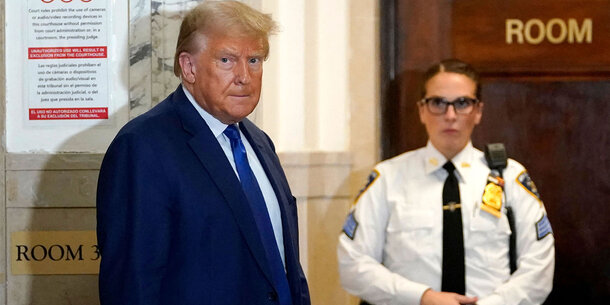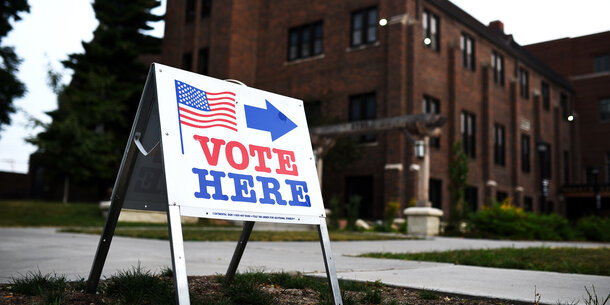Florida’s prosecution of ineligible voters with past convictions was politically motivated from the beginning. The individuals accused didn’t knowingly commit voter fraud — they simply weren’t aware that their past criminal convictions barred them from voting. Some local prosecutors have, rightfully, declined to bring charges under similar circumstances.
In response, rather than calling an end to the needless criminal cases and addressing the root cause of the confusion that led to them, the state government has doubled down, changing state law to tighten Gov. Ron DeSantis’s control over the prosecution of alleged “voter fraud” identified by the state’s new and unnecessary election crimes office. It’s the latest chapter in an episode that illustrates why politics and law enforcement should be kept separate, especially in the realm of voting and elections.
DeSantis initially proposed the Office of Election Crimes and Security — which, as first conceived, would have had prosecutorial power — because “people weren’t getting prosecuted” by local prosecutors. In its first round of arrests conducted just five days before Florida’s primary election last August, the office partnered with state and local police in the Democratic-leaning counties of Broward, Hillsborough, Miami-Dade, Orange, and Palm Beach. Flanked by over a dozen uniformed police officers, DeSantis announced the arrest of 20 people with past convictions, hailing these as his election crimes office’s “opening salvo.”
Of the 19 people the Brennan Center has been able to identify, all appear to have been confused or misled about their eligibility when they allegedly voted in 2020. Recognizing that this misunderstanding is hardly a crime, some local prosecutors declined to bring charges, likely prompting statewide prosecutors to seize control of the cases.
Florida courts, however, put a roadblock in DeSantis’s path. State law only allowed the office of statewide prosecution to prosecute certain crimes that affected or occurred in 2 or more of Florida’s 20 judicial circuits. To account for this, statewide prosecutors argued they had the authority to prosecute the arrested individuals because they registered and voted in one circuit, while state authorities in a different circuit approved their registrations and allowed them to vote. Not convinced by this tortured logic, which would effectively treat Florida’s Division of Elections as a coconspirator, four of the office’s cases were dismissed by judges in Broward, Miami-Dade, and Orange counties as violating state law.
To salvage the prosecutions, the legislature passed, and DeSantis signed on February 15, S.B. 4-B, which expands the authority of statewide prosecutors so they can prosecute alleged voter fraud identified by the state’s election police. Troublingly, this change boosts the executive branch’s ability to use law enforcement for political ends. Unlike local prosecutors, who are elected by the public, statewide prosecutors are supervised by the state’s attorney general — an ally of DeSantis — and are thus more subject to partisan agendas.
The new law specifies that such crimes, when “facilitated by or connected to the use of the Internet,” are considered to have occurred “in every judicial circuit within the state.” In essence, the law clears the way for statewide prosecutors to go after alleged voter fraud cases that a local prosecutor might decline to charge because of a lack of evidence. It is a clear attempt to circumvent the Florida courts’ rulings and the discretion of local prosecutors who are not beholden to the DeSantis administration.
Not only is the expansion of the office of statewide prosecution’s power a waste of resources given the lack of fraud in Florida’s elections — or any U.S. elections, for that matter — but it also risks turning law enforcement into a political tool for the executive branch to scare eligible voters away from the polls.
By DeSantis’s own admission, Florida’s 2020 election was a resounding success. His election crimes office’s data indicates that the state’s elections are secure: since opening its doors last July, the office has already closed more than half of its 3,026 investigations into alleged “election law violations or irregularities.” And while a tiny percentage of those investigations led to an arrest, the vast majority of those arrests were of people with past convictions who made honest mistakes about their voter eligibility.
Without the justification of fraud, the apparent intent behind expanding statewide prosecutors’ authority is to punish citizens with past convictions who mistakenly registered or voted in good faith and to intimidate eligible voters from exercising their right to vote, which Floridians voted overwhelmingly to restore in 2018. The consequences disproportionately impact voting-age Black Floridians, about one in eight of whom were disenfranchised as of 2022.
The prosecutions also distract from the root cause of the problem: Florida’s convoluted system for determining voter eligibility. DeSantis and his allies in the legislature sabotaged the amendment that restored voting rights by making it nearly impossible for citizens with past convictions to determine their voter eligibility. These confusing rules, coupled with various administrative failures and the state’s refusal to provide any meaningful guidance about whose rights have been restored, led these Floridians to register or vote without knowing that the type of their conviction rendered them ineligible. Videos showing the bewildered reactions of some of those arrested offer further evidence that they didn’t commit deliberate fraud.
Empowering law enforcement to penalize citizens struggling to navigate Florida’s complex voter eligibility rules won’t fix the problem of the state’s own making. As the Brennan Center and a coalition of nonpartisan civil and voting rights groups have warned, Florida’s new law stands only to further ensnare people with past convictions in the criminal justice system and discourage eligible voters, especially Black Floridians, from participating in democracy.







